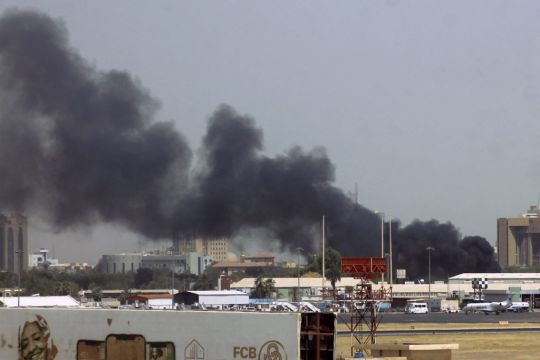Sudan's main paramilitary group said it had taken control of the presidential palace, the residence of the army chief and Khartoum international airport on Saturday in an apparent coup attempt as clashes erupted with the military.
The Rapid Support Forces (RSF), which accused the army of attacking them first, also said they had seized the airports in the northern city of Merowe and in El-Obeid in the west.
The Sudanese air force is conducting operations against the RSF, the army said. Footage from broadcasters showed a military aircraft in the sky above Khartoum, but Reuters could not independently confirm the material.
Gunfire could be heard in several parts of Khartoum and eyewitnesses reporting shooting in adjoining cities.
A Reuters journalist saw cannon and armoured vehicles deployed in the streets of the capital, and heard heavy weapons fire near the headquarters of both the army and RSF.
Doctors said clashes had occurred in residential neighbourhoods and civilians had been injured.
Clashes were also taking place at the headquarters of Sudan's state TV, an anchor who appeared on screen briefly said.
Egypt, one of the most influential Arab states, expressed grave concern over the clashes and called on all parties to exercise restraint, the foreign ministry said.
The US ambassador to Sudan, John Godfrey, said the escalation of tensions to direct fighting was "extremely dangerous" and called urgently on the senior leadership to stop the clashes. Godfrey said he and embassy staff were sheltering in place.
The army said the RSF had tried to attack its troops in several positions after witnesses reported heavy gunfire in multiple parts of the country, raising fears of a full-blown conflict.
The RSF, which analysts say is 100,000 strong, said its forces were attacked first by the army.
Earlier, the RSF, headed by former militia leader General Mohamed Hamdan Dagalo, better known as Hemedti, said the army had surrounded one of its bases and opened fire with heavy weapons.
Hemedti's RSF was formed from militias accused of war crimes in the Darfur conflict. In June 2019, security forces led by the RSF raided a Khartoum pro-democracy camp and nearly 130 people died, according to a tally by activist doctors.
A prolonged confrontation between the RSF and the army could significantly worsen the security situation across a vast country already dealing with economic breakdown and flare-ups of tribal violence.
Hemedti has been deputy leader of the ruling Sovereign Council headed by General Abdel Fattah al-Burhan since 2019.
Civilian political parties that had signed an initial power-sharing deal with the army and the RSF called on them to cease hostilities. The Russian embassy also called for an end to the violence.
The hostilities followed days of tension between the army and the RSF, which could undermine long-running efforts to return Sudan to civilian rule after power struggles and military coups.
Hemedti, once one of the most feared and ruthless militia leaders in Darfur, had put himself at the forefront of a planned transition towards democracy, unsettling fellow military rulers and triggering a mobilisation of troops in the capital Khartoum.
The rift between the forces came to the surface on Thursday, when the army said that recent movements, particularly in Merowe, by the RSF were illegal.
On Saturday there was a heavy exchange of gunfire in Merowe, eyewitnesses told Reuters.
The RSF called the army's actions a "brute assault" which should be condemned. It said the paramilitary group had informed local and international mediators of developments.
The RSF, which together with the army overthrew long-ruling autocrat Omar al-Bashir in 2019, began redeploying units in Khartoum and elsewhere amid talks last month on its integration into the military under a transition plan that would lead to new elections. -Reuters







